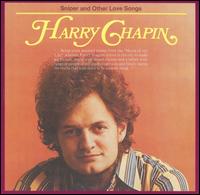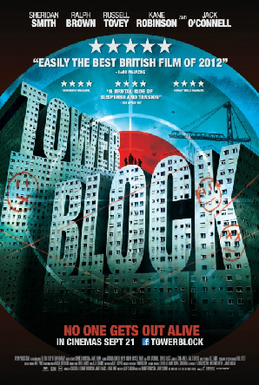This article possibly contains original research .(May 2023) |
"Sniper" is a ballad written by Harry Chapin and first released on the album Sniper and Other Love Songs in 1972.
This article possibly contains original research .(May 2023) |
"Sniper" is a ballad written by Harry Chapin and first released on the album Sniper and Other Love Songs in 1972.
The song, nearly 10 minutes long, is based on the University of Texas tower shooting in 1966, with some fictional elements. The song does not name the actual sniper, Charles Whitman, or the location. The victims' names have also been changed.
Harry wrote this piece using three distinct "voices" for dramatic effect. Chapin sings all three voices. The first is the narrator, telling the story. The second is a variety of people reacting to the event, as if in response to news media questions. And the third voice is that of the Sniper himself, stating his fears, his motives, and his raw emotions. Throughout the song, the time signature changes several times, with variations in tempo, identifying and supporting the three different voices. The narrator begins by describing the Sniper climbing the stairs of the tower, "two bulky suitcases hang[ing] from his hands," who then begins shooting at people on the streets below. We hear the public's response and descriptions of the Sniper by those who knew him. The narrator returns and this cycle begins again. Eventually the Sniper pours out his pain over the failed relationship between himself and his mother, who had ignored him as a child.
In the end, the sniper is killed by police officers who have climbed the tower. The sniper's last words – "I was, I am, and now I will be" – lend insight into the psychology of the sniper, who has been on a lifelong quest for self actualization. [ citation needed ]

Charles Joseph Whitman was an American mass murderer and Marine veteran who became known as the "Texas Tower Sniper". On August 1, 1966, Whitman used knives to kill his mother and his wife in their respective homes, then went to the University of Texas at Austin with multiple firearms and began indiscriminately shooting at people. He fatally shot three people inside UT Austin's Main Building, then accessed the 28th-floor observation deck on the building's clock tower. There, he fired at random people for 96 minutes, killing an additional eleven people and wounding 31 others before he was shot dead by Austin Texas law enforcement. Whitman killed a total of seventeen people; the 17th victim died 35 years later from injuries sustained in the attack.

Harry Forster Chapin was an American singer-songwriter, philanthropist, and hunger activist best known for his folk rock and pop rock songs. He achieved worldwide success in the 1970s. Chapin, a Grammy Award-winning artist and Grammy Hall of Fame inductee, has sold over 16 million records worldwide.

Sniper and Other Love Songs is the second studio album by the American singer/songwriter Harry Chapin, released in 1972. The album's title song is a vaguely fictionalised account of Charles Whitman's shootings from the clocktower of the Main Building of the University of Texas at Austin in August 1966. In 2004 it was released as a double CD package with Heads & Tales featuring several previously unreleased out-takes.

"The Outsider" is a short story by American horror writer H. P. Lovecraft. Written between March and August 1921, it was first published in Weird Tales, April 1926. In this work, a mysterious individual who has been living alone in a castle for as long as he can remember decides to break free in search of human contact and light. "The Outsider" is one of Lovecraft's most commonly reprinted works and is also one of the most popular stories ever to be published in Weird Tales.
The Sacred Fount is a novel by Henry James, first published in 1901. The book follows an unnamed narrator at a weekend party in the English countryside as he attempts to discover the truth about the love lives of his fellow guests. The Sacred Fount is the only one of James's novels written in first person. Since its publication it has received mixed responses from critics, and it was not included in James's New York Edition, the edition of his work he considered definitive.

The Vision is a 1977 horror-mystery novel by American writer Dean Koontz.
"The Dream of a Ridiculous Man" is a short story by Fyodor Dostoevsky. It chronicles the experiences of a man who decides that there is nothing of any value in the world. Slipping into nihilism with “terrible anguish”, he is determined to commit suicide. However, after a chance encounter with a young girl, he begins an inner journey that re-instills a love for his fellow man. The story first appeared in Dostoevsky's self-published monthly journal A Writer's Diary in 1877.

December 7th is a 1943 propaganda documentary film produced by the US Navy and directed by Gregg Toland and John Ford, about the December 7, 1941 attack on Pearl Harbor, the event which sparked the Pacific War and American involvement in World War II. Toland was also the film's cinematographer and co-writer. The original version of this film, with a running time of 82 minutes, was not released but was retained by the National Archives. An edited version of 32 minutes length, which removed a long introductory segment and a shorter epilogue, was given limited release to specific audiences but won the Academy Award for Best Documentary in 1944. This is the only film Toland ever worked on for which he received a director credit.
"A Better Place to Be" is a song by Harry Chapin from his 1972 album, Sniper and Other Love Songs. The song is about a midnight watchman confiding in a waitress, while drinking gin, about a woman that he met a week before and had a one-night stand with.
"30,000 Pounds Of Bananas," sometimes spelled "Thirty Thousand Pounds Of Bananas," is a folk rock song by Harry Chapin from his 1974 album, Verities & Balderdash. The song became more popular in its live extended recording from Chapin's 1976 concert album, Greatest Stories Live that started the phrase "Harry, it sucks." The song is based on an actual truck accident that occurred in Scranton, Pennsylvania, in 1965.
"Corey's Coming" is a song written and sung by Harry Chapin. It was released on his 1976 album On the Road to Kingdom Come.
The Orchid Gardener is a 1977 Danish experimental film written, produced, shot, edited and directed by Lars von Trier.
"The Mayor of Candor Lied" is a song written and sung by Harry Chapin. It was released on his 1976 album On the Road to Kingdom Come. The song tells the story of a poor farm boy anxious to marry the daughter of the town's mayor, even if he must go so far as to blackmail the mayor to get his way.

The Deadly Tower is a 1975 American made-for-television action drama thriller film directed by Jerry Jameson. It stars Kurt Russell and Richard Yniguez and is based on the University of Texas tower shooting.

Tower Block is a 2012 British thriller film directed by James Nunn and Ronnie Thompson as their directorial debut, and written by James Moran. The film stars Sheridan Smith, Jack O'Connell, Ralph Brown, and Russell Tovey and entails residents of a block of flats targeted by an unseen sniper after witnessing the murder of a teenager. Tower Block was theatrically released in the United Kingdom on 21 September 2012 and was also the closing film at the 2012 FrightFest Film Festival.
"I Wanna Learn a Love Song" is a song written and performed by Harry Chapin. The song was included on his 1974 album, Verities & Balderdash. The song is about a guitar teacher who gives guitar lessons to a woman who is falling in love with him.
"Halfway to Heaven" is a song written and performed by Harry Chapin. The song was included, but not released as a single, on his 1974 album, Verities and Balderdash. The song is based on a true conversation he had while at a train station about sexual morality.
"What Made America Famous?" is a song written and performed by Harry Chapin. The song was included on his 1974 album, Verities & Balderdash. It has also been included on numerous posthumous compilation albums. The song inspired Chapin to write the award nominated Broadway musical, The Night That Made America Famous.
"An Open Letter to My Teenage Son" is a spoken-word song performed by American WMAX radio newscaster Victor Lundberg. Released in September 1967, the song was written by Robert R. Thompson and produced by Jack Tracy. The recording of Lundberg's vocals is played over "Battle Hymn of the Republic." It features on Lundberg's only album, "An Open Letter."

Knulp is a series of three tales by Hermann Hesse, published in 1915 by S. Fischer Verlag. The three episodes are about a vagrant called Knulp. Hesse wrote these tales between 1907 and 1914 and they are considered to be part of his “Gerbersau” cycle.